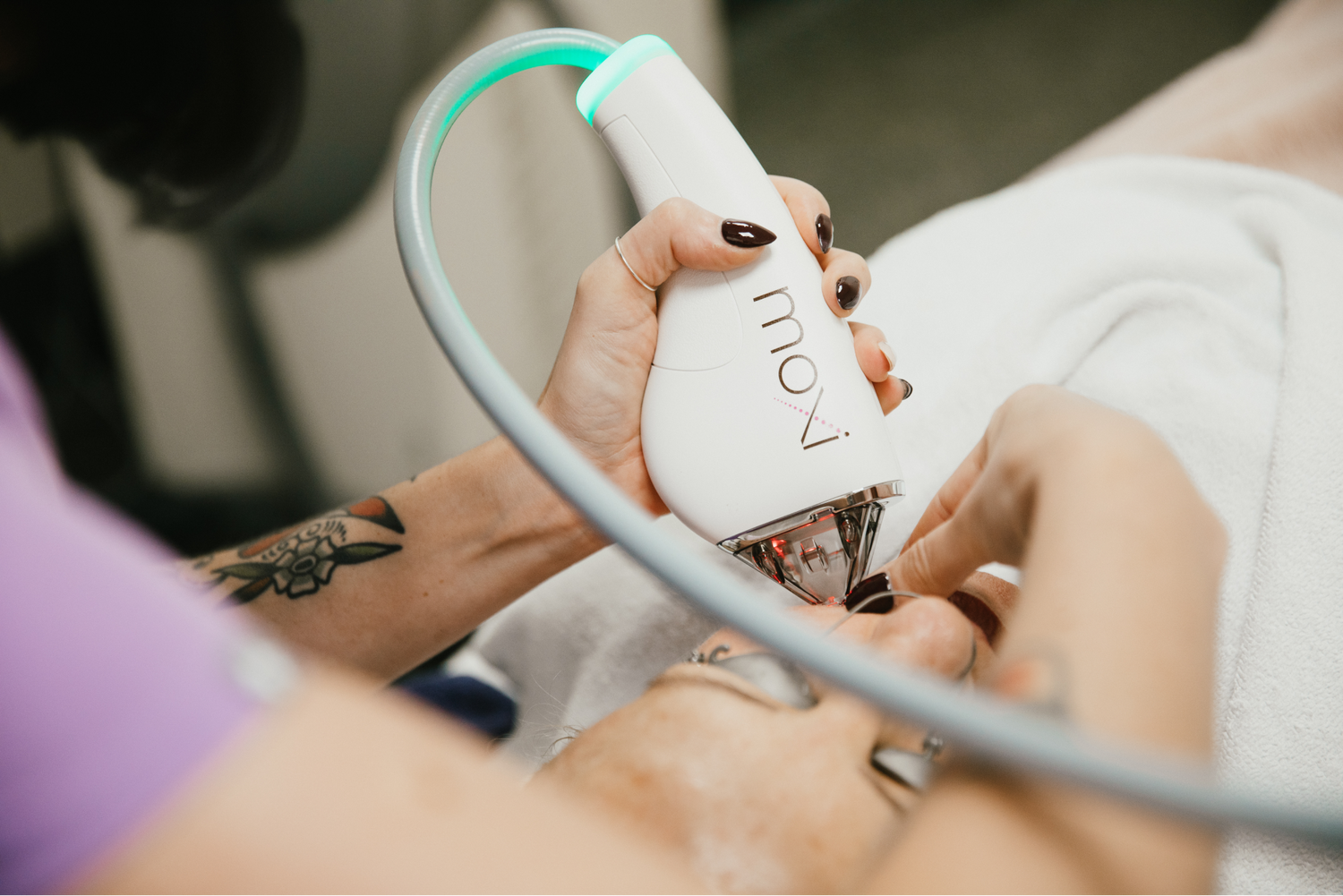Becoming a mother brings immeasurable joy, and sometimes unexpected changes to your skin. If you've noticed dark patches appearing on your face during or after pregnancy, you're experiencing Melasma, often called "the mask of pregnancy." This common condition affects up to 90% of pregnant women, yet many feel unprepared for how persistent and emotionally challenging it can be. For busy new mothers juggling career and family, Melasma can feel like an unwelcome reminder of how much your body has changed. The good news is that modern laser technology, specifically the Moxi laser, offers a gentle yet effective approach to addressing postpartum pigmentation concerns.
Understanding Melasma: More Than Surface-Deep
Melasma appears as symmetrical brown or grey-brown patches, typically on the forehead, cheeks, bridge of the nose, and upper lip. Unlike other forms of hyperpigmentation, Melasma has a distinctive pattern and deeper-rooted causes that make it particularly challenging to address.
The Hormonal Connection
Pregnancy hormones, particularly elevated levels of oestrogen and progesterone, trigger increased melanin production. These hormones activate melanocytes (pigment-producing cells) in susceptible individuals, leading to the characteristic patchy pigmentation of Melasma.
The "Perfect Storm" of Factors
Melasma development typically requires a combination of factors:
- Hormonal fluctuations (pregnancy, breastfeeding, contraceptives)
- UV exposure (even minimal amounts can trigger flare-ups)
- Genetic predisposition (family history of Melasma)
- Skin type (more common in individuals with naturally higher melanin production)
Why Melasma Persists? Unlike sun spots or age spots that exist primarily in the upper layers of skin, Melasma often extends into deeper dermal layers. This deeper pigmentation explains why surface treatments and over-the-counter products frequently provide disappointing results.
The Postpartum Challenge
Many women hope their Melasma will fade naturally after delivery, but the reality is often more complex. While some improvement may occur, complete resolution is uncommon without professional intervention.
- Breastfeeding Considerations: Continued hormonal fluctuations during breastfeeding can maintain or even worsen Melasma. Many new mothers find themselves in a frustrating cycle where their pigmentation remains prominent while their treatment options feel limited.
- The Emotional Impact: For women accustomed to clear, even-toned skin, Melasma can significantly impact confidence and self-image. Professional photos, social events, and even daily mirror encounters can become sources of self-consciousness during what should be a joyful time.
- Lifestyle Limitations: Traditional Melasma treatments often require avoiding sun exposure entirely and can involve harsh chemicals that nursing mothers prefer to avoid. This creates practical challenges for active mothers who want to maintain their normal lifestyles.
Why Traditional Treatments Fall Short
Topical Treatments
While hydroquinone and tretinoin are considered gold standards for Melasma treatment, they have significant limitations:
- May not be suitable during breastfeeding
- Can cause irritation and sensitivity
- Require months of consistent use with variable results
- Often only address superficial pigmentation
Chemical Peels
Aggressive peels can worsen Melasma in some individuals, particularly those with darker skin types. The risk of post-inflammatory hyperpigmentation makes this approach unsuitable for many Melasma sufferers.
IPL and Traditional Lasers
Older laser technologies can sometimes worsen Melasma by creating heat and inflammation that triggers additional pigment production.
The Moxi Laser Advantage
Moxi represents a breakthrough in Melasma treatment, offering a gentler approach that works with your skin's natural healing processes rather than against them.

How Moxi Works Differently?
Moxi is a non-ablative fractional laser that creates controlled micro-zones of treatment while leaving surrounding tissue intact. This approach:
- Stimulates natural cell turnover and collagen production
- Gradually improves pigmentation without aggressive tissue removal
- Minimises risk of post-inflammatory hyperpigmentation
- Requires minimal downtime, making it practical for busy mothers
Breastfeeding Compatibility
Moxi laser treatment is considered safe during breastfeeding as it doesn't involve topical or systemic medications that could affect milk production or composition.
Minimal Downtime
By treating only a fraction of the skin at a time, Moxi allows for faster healing and reduced risk of complications. The untreated areas serve as reservoirs for healing, promoting rapid recovery and optimal results. Most patients experience only mild redness similar to a light sunburn for 24-48 hours following treatment. This minimal disruption fits well with the demands of caring for a new baby.
Gentle Recovery Process
The non-ablative nature of Moxi means the skin surface remains intact, reducing infection risk and allowing for normal skincare routines with minor modifications.
Treatment Timeline and Expectations
Initial Consultation:
A comprehensive skin assessment determines the depth and extent of your Melasma, allowing for personalised treatment planning. This evaluation considers your skin type, lifestyle factors, and current hormonal status.
Treatment Series:
Most patients benefit from a series of 3-4 Moxi treatments spaced 3-4 weeks apart. This gradual approach allows your skin to respond naturally while minimising the risk of irritation or rebound pigmentation.
Visible Improvements:
Many patients notice initial improvements in skin texture and radiance within 2-3 weeks of their first treatment, with pigmentation improvement becoming more apparent over 2-3 months as cellular turnover occurs.
Maintenance Approach:
Periodic maintenance treatments help sustain results and address any new pigmentation that may develop due to ongoing hormonal fluctuations or sun exposure.
Frequently Asked Questions
- When can I start treatment after delivery? Moxi treatment can typically begin 6-8 weeks postpartum, once initial healing is complete and hormones begin stabilising.
- Will my Melasma return? While Moxi can significantly improve existing Melasma, ongoing sun protection and hormonal management are essential for preventing recurrence.
- How does treatment fit with my busy schedule? Each Moxi session takes approximately 30 minutes, with minimal downtime that won't interfere with caring for your baby or returning to work.
- Can I wear makeup after treatment? Most patients can resume normal makeup application 24-48 hours after treatment, once any initial redness subsides.
- What if I'm planning another pregnancy? It's generally recommended to complete your Melasma treatment series before conceiving again, as pregnancy hormones may reactivate pigmentation.
The MD Cosmetic & Skin Approach for New Mothers
Understanding Your Unique Needs
New mothers have specific concerns and constraints that require a tailored approach. During your consultation, we'll discuss:
- Your specific Melasma pattern and severity
- Treatment options suitable for your current life stage and your current breastfeeding status
- Realistic expectations and timeline for improvement
- Safe skincare routine recommendations
- Long-term maintenance strategies
Flexible Scheduling
We understand that life with a new baby is unpredictable. Our scheduling accommodates the realities of motherhood with flexible appointment times and understanding staff.
Comprehensive Care
Beyond laser treatment, we provide guidance on:
- Pregnancy-safe skincare routines
- Long-term pigmentation prevention
- Hormonal considerations for future pregnancies
- Maintenance strategies that fit your lifestyle
Taking the Next Step
If you're struggling with postpartum Melasma, you're not alone, and you don't have to accept it as your new normal. Modern laser technology offers safe, effective solutions that can help restore the clear, even-toned skin you remember.
Ready to reclaim clear, confident skin after motherhood? Book your consultation today to discover how Moxi laser treatment can help address your postpartum pigmentation concerns safely and effectively. Contact our friendly team on 0400 400 982 or book online now.
---
Important Information: Individual results may vary. This information is for educational purposes and should not replace professional medical advice. All treatments should be performed by qualified practitioners following proper assessment and consultation. Please discuss your individual circumstances and treatment suitability during your consultation.
This article contains general information about cosmetic treatments. Results may vary between individuals. A consultation with a qualified practitioner is recommended to determine the most suitable treatment approach for your individual needs.





